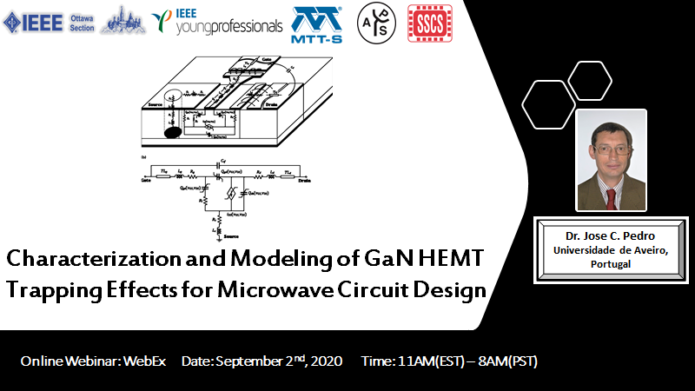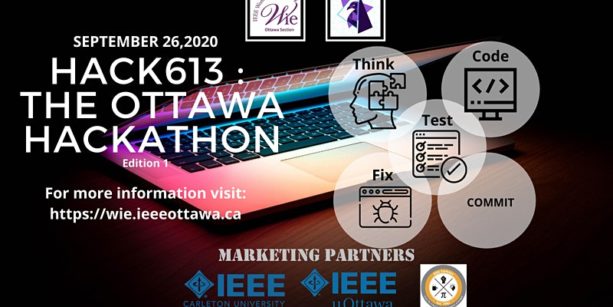Events
IEEE CANADA TECHNOLOGY LEADERSHIP WEBINAR SERIES – III
Speaker: Tom Coughlin of IEEE USA
Topic: IEEE-USA Supports Public Policy For A Better WorldÂ
IEEE-USA supports public policy and career and member services for IEEE members in the USA. This talk will include a brief discussion on what IEEE-USA does and will focus on its public policy activities to support future technologies, funding of science and technology, immigration policies that support a path to citizenship and support for engineers and technologists. I will also discuss the impact of the COVID-19 epidemic and what what IEEE and IEEE-USA is doing to help its members as well as society as a whole, to recover from this extraordinary event. This talk will include discussion of the future of work and the role of technology to enable remote work and new tools to work together in the real world even when we can’t be there physically.
Biography:
Tom Coughlin, President, Coughlin Associates is a digital storage analyst and business and technology consultant. He has over 39 years in the data storage industry with engineering and management positions at several companies. Coughlin Associates consults, publishes books and market and technology reports (including The Media and Entertainment Storage Report and an Emerging Memory Report), and puts on digital storage-oriented events. He is a regular storage and memory contributor for forbes.com and M&E organization websites. He is an IEEE Fellow, Past-President of IEEE-USA and is active with SNIA and SMPTE. For more information on Tom Coughlin and his publications and activities go to www.tomcoughlin.com.
Title: Josephson Arbitrary Waveform Synthesizer as a Quantum Standard of Voltage and Current Harmonics
Speaker: Dr. Dimitrios Georgakopoulos, Senior Research Scientist, National Measurement Institute, Sydney, Australia
Date/Time:Â Thursday, July 09, 2020, 6:30 pm – 7:30 p.m. EDT
Abstract: Josephson arbitrary waveform synthesizers (JAWS) are becoming a viable technology for national metrology institutes and industry to establish quantum standards of direct and alternating voltage. At the National Measurement Institute of Australia (NMIA) we have extended the application of the JAWS to provide a standard of both the magnitude and the phase of harmonics in a distorted waveform. Harmonic analysis is critical in a number of industrial applications such as electric power systems, power electronics, characterization of systems and materials and acoustics and vibration. At present, in the calibrations of power analyzers, the traceability of the magnitude of the harmonics is based on ac-dc transfer measurements. However, there is a gap in the traceability of the phase of the harmonics relative to the fundamental. The NMIA calibration system uses a JAWS chip from the National Institute of Standards and Technology (NIST), USA, a precision inductive voltage divider and a set of current shunts designed and manufactured by NMIA. For distorted waveforms with harmonic magnitudes from 5% to 40% of the fundamental, the calibration system can measure odd harmonics up to the 39th with magnitude uncertainties better than 0.001 % of the fundamental for voltage (from 0.01 V to 240 V) and current (from 0.005 A to 20 A) waveforms. The best phase uncertainties range from 0.001° to 0.010° (k = 2.0), depending on the harmonic number and harmonic magnitude. We anticipate that the ability of the JAWS to generate distorted waveforms with the lowest possible uncertainty in the magnitude, and phase spectra will make it a unique tool for low-frequency spectrum analysis.
Speaker’s Bio: Dimitrios Georgakopoulos (IEEE AM’11–M’12–SM’12) was born in Athens, Greece, in 1972. He received his B.Eng. degree in electrical engineering from the Technological Educational Institution of Piraeus, Egaleo, Greece, in 1996; his M.Sc. degree in electronic instrumentation systems from the University of Manchester, Manchester, UK, in 1999; and Ph.D. in electrical engineering and electronics from the University of Manchester Institute of Science and Technology, Manchester, UK, in 2002. From 2002 to 2007, he worked as a research scientist at the National Physical Laboratory, UK. In 2007, he joined the National Measurement Institute, Australia, as a research scientist, where he has been working on the development of quantum voltage standards and low frequency electromagnetic compatibility (EMC) standards. Dr Georgakopoulos is an Associate Editor of the IEEE Transactions on Instrumentation and Measurement, member of the IEEE IMS Measurements in Power Systems Committee (TC‑39), member of the NATA Accreditation Advisory Committee for Calibrations, and member of the American Association for the Advancement of Science (AAAS), USA.
Admission: Free, but registration is required at https://events.vtools.ieee.

IEEE Ottawa Section: MTT-S / AP-S Chapter presents:
Title: Characterization and Modeling of GaN HEMT Trapping Effects for Microwave Circuit Design
Date: September 2nd, 2020
Time: 11 AM (ET)
Register at: https://events.vtools.ieee.org/m/238482
This talk will review some recent advancements achieved on the characterization and modelling of the trapping effects felt in GaN HEMT transistors, and their impact on microwave circuit design. Because of their nowadays importance, a particular attention will be payed to applications on high power amplifiers for mobile wireless infrastructure and pulsed radar applications.
For that, the talk will start by recollecting the most common model formulations adopted for the various levels of RF engineering, from the device level (physics) to the transistor (circuit) and amplifier (system) level. Starting by the Shockley-Read-Hall capture and emission processes we will be able to understand one of the fundamental signatures of trapping effects, the significantly different charge and discharging time constants, and its impact on power amplifier nonlinear distortion behavior. Then, some widely adopted approaches of the channel current transients’ characterization are addressed and the talk concludes by presenting some illustrative cases of application to RF high power amplifiers.
Speaker: Jose C. Pedro
José C. Pedro received the Diploma, Ph.D., and Habilitation degrees in electronics and telecommunications engineering from the Universidade de Aveiro, Aveiro, Portugal, in 1985, 1993, and 2002, respectively.
He is currently a Full Professor with the Universidade de Aveiro and head of the Aveiro site of the Instituto de Telecomunicações. He has authored 2 books and authored or co-authored more than 200 papers in international journals and symposia. His current research interests include active device modelling and the analysis and design of various nonlinear microwave circuits.
Dr. Pedro was a recipient of various prizes including the 1993 Marconi Young Scientist Award, the 2000 Institution of Electrical Engineers Measurement Prize, the 2015 EuMC Best Paper Microwave Prize, and the Microwave Distinguished Educator Award. He has served the scientific community as a Reviewer and an Editor for several conferences and journals, namely, the IEEE TRANSACTIONS ON MICROWAVE THEORY AND TECHNIQUES, for which he was the Editor-in-Chief.
Date: Sept 24th, 2020
Time: 02:00 PM to 03:00 PM EDT
Speaker: Ken Coates, Professor, University of Saskatchewan
Topic: Technology-Enabled Indigenous and Remote Communities
Registration:Â https://events.vtools.ieee.org/m/238665Â
Summary:
As the COVID-19 Pandemic demonstrated, almost all Indigenous and remote communities suffered from serious infrastructure deficits. With limited or unreliable Internet, poor quality electricity, and weak health care services, these communities were uniquely vulnerable to the disease and the economic and social challenges that accompanied the pandemic. But Canadians already knew that Indigenous and remote communities are poorly served and largely lift out of the so-called “innovation economy.” It is time to develop a strategy for bringing technology-enabled opportunities to Indigenous and remote communities. This webinar presents a model for digitally-enabled Indigenous and remote communities, explores the barriers to implementing this “inversion” of Canadian innovation and that contemplates strategies for addressing quality of life issues in collaboration with residents and local governments.
Biography:
Ken Coates is Canada Research Chair in Regional Innovation at the Johnson-Shoyama Graduate School of Public Policy, University of Saskatchewan. His work focuses on the development of strategies to promote 21st century well-being in small town, rural, Indigenous and remote Canada. Ken’s major project examines the potential contributions — and negative impacts — of emerging technologies on rural and remote communities.
For more information and speaking opportunity, please contact, Dr Kexing Liu, IEEE Canada Outreach and Partnership Committee Chair, kexing.liu@ieee.org

Date and Place: The event will be held online on September 26th and 27th, 2020.
“Every accomplishment starts with the decision to try†~ John F. Kennedy
What?
New to Hackathons? Are you also interested in participating in IEEEXtreme 14.0? IEEE WIE Ottawa presents the first ever Mock Hackathon in Ottawa! Win Exciting Prizes and get experience with us. No need to think of an idea! The questions will be given to you. Our mentors will further help you to get a head start in your hackathon journey! This is a practice event just for you! Learn more about IEEEXtreme here-> https://ieeextreme.org/
When?
September 26th and 27th, 2020
Where?
The event is fully online including the mentorship*.
Agenda
September 26th, 2020
01:00 PM The opening ceremony
02:00 PM Commencement of Hackathon
05:00 PM Final Submission
September 27th, 2020
01:00 PM Results declaration webinar
01:30 PM Prize announcement
02:00 PM The closing ceremony
For More Details Visit: https://wie.ieeeottawa.ca/hack613-the-ottawa-hackathon/

